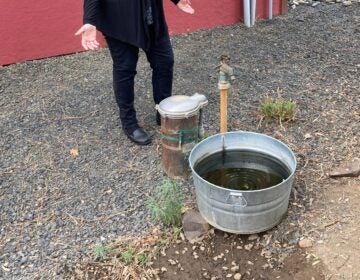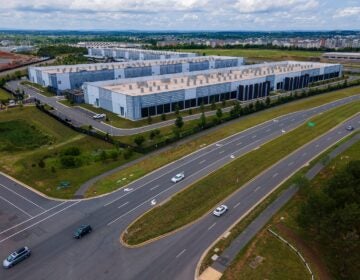Digital meets gravestone: a lesson in ancestry
After suffering a series of personal losses, a Bucks County couple is launching a new business that they say will help others grieve — in a digital way.
Lorie Miller is bent over her grandparents’ grave in Northwood Cemetery, in Philadelphia’s West Oak Lane section, holding a two-inch square she’s preparing to attach next to the headstone’s names and dates.
“Mom do you have a preference as to where you’d like them placed? Maybe the top left and the top right?” Miller asked her mother Marilyn Elias.
It’s a QR symbol: one of those square digital designs you can scan with a smartphone. A minute later, Miller cleans off the stone, peels the back off the QR code to expose the adhesive, and pushes it into place. Miller hopes many more of the tags will be attached in other cemeteries.
“Over the last three years, I lost both my grandparents and more recently my brother and we just really wanted a way to memorialize them forever. And we just thought this was a neat, easy way to do it,” she says.
Miller and her husband are launching a new business, called “Digital Legacys,” to sell the tags — that she says make it easy remember loved ones. Mourners who pull out their smart phones at the gravesite and scan the QR symbol will be sent to a personalized legacy web page.
“They can just upload the photos to the website and we can build their website for them, and they give us a biography of their loved ones. And they can upload videos and backgrounds and music and it’s just a great technology.”
Miller’s mother understands the value of her daughter’s digital aid, “When you come out to the cemetery and you’re just standing and looking at a headstone it’s just looking at printing or writing and you usually walk away feeling teary-eyed or depressed.”
Elias hopes the technology will make a cemetary visit come alive.
“Now I feel that I come out and I put my smart phone on and I can look at my mom and say, ‘Mom, what were you thinking when you wore that hairdo years ago?’ … I think you can better feel and walk away feeling better. Maybe even laughing sometimes.”
The Miller’s QR code business won’t be the first.
David Quiring is president of Quiring Monuments in Seattle Washington. He’s designed the “living headstone” — a tag made of durable plastic that’s laser cut with a tag that can be attached on a gravestone and read with a smart phone.
Quiring’s long been on a quest to tell more of the deceased person’s story than just the name and dates. He admits using technology to mourn, isn’t for everybody, but he says it’s not just young digitally-savvy younger consumers who are interested.
“I had a gentleman come in just last week who was in his 70’s who said you know I have all this stuff about my mom and dad and I’m the last person in line and I would like to put it someplace where people in a future generation, future time, would be able to look and see my mom and dad.”
While QR codes may not be around forever, Quiring says its the best option he has found so far to tell a person’s story.
Back at the cemetery, Rick Miller, Lorie’s husband, points out that the QR codes could even offer a chance to get to know a stranger — who’s name or birth or death date makes a passerby like him, curious.
WHYY is your source for fact-based, in-depth journalism and information. As a nonprofit organization, we rely on financial support from readers like you. Please give today.




